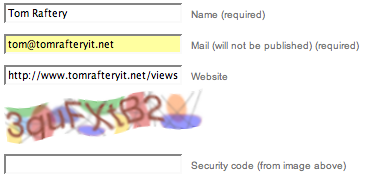I am developing and running a blog training course starting next September 25th for IT@Cork.
It will be a 5 week course, one hour a week (6pm Monday evenings) in the National Software Centre in Mahon. It will be open to non-members and members of IT@Cork alike. The course fees will be €50 for IT@Cork members and €100 for non-members.
The entire proceeds of this training will be going to IT@Cork.
A very rough outline of what I will be going through each night is as follows:
Week 1. Intro to blogging and RSS
How to set up a blog
Hosted vs non-hosted
Free vs. paid
Week 2. How to optimise your blog
FeedBurner
Spam prevention
SEO
Week 3. Your blog content
Links
images
RSS searches
Week 4. How to Promote your blog and posts
Week 5. How to Podcast
Hosting
Marketing
This outline is open to suggestion and change - please feel free to suggest any topics which you feel are missing and/or under-represented in the comments to this post.
I have created a Google Calendar for this training course - you can subscribe to the calendar and see any changes to the course outline as it becomes firmed up.
Here is an RSS link for the training calendar.
Here is an iCal link for the training calendar.
And here is a static HTML link to the training calendar.
Email [email protected] to book your place.
UPDATE - In response to valuable feedback from Keith and Paul in the comments I have added in RSS and images to weeks 1 and 3 of the course. The Google Calendar has also been updated







Is blogging becoming monologous?
Robert Scoble announced the other day that he was going to start moderating the comments on his blog:
Steve Rubel, similarly moderates his comments, Marketing guru Seth Godin has turned off comments on his blog, Michelle Malkin only allows trackbacks and others have systems in place which require you to register to leave a comment.
This is a disappointing trend in blogging because it starts to take the meme ‘markets are conversations’ and change it to markets are monologs (once more!). Further - how can we now seriously evangelise the benefits of having comments enabled when some of the most prominent bloggers have theirs locked down?